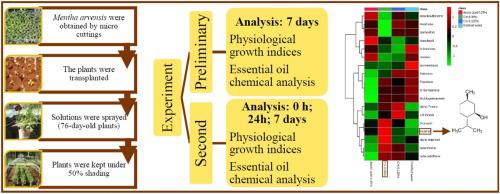Industrial Crops and Products ( IF 5.6 ) Pub Date : 2021-08-28 , DOI: 10.1016/j.indcrop.2021.113987 Elias Alves da Silva 1, 2 , Ana Cardoso Clemente Filha Ferreira de Paula 3 , Vivianny Nayse Belo Silva 4 , Amauri Alves de Alvarenga 1 , Suzan Kelly Vilela Bertolucci 2

|
Elicitors are molecules that can induce responses in plants, such as the production of secondary metabolites. Mentha arvensis L. is a medicinal plant belonging to the Lamiaceae family with great importance for the worldwide production of essential oil. This work aimed to evaluate the response of elicitor application to the growth and essential oil production of M. arvensis. Two experiments were carried out at different times under nursery conditions with 50 % shading. The preliminary experimental design was completely randomized with three replications and five treatments (distilled water; 1% glacial acetic acid solution; and 0.25 %, 0.5 % and 0.75 % chitosan), and a second experiment (distilled water, 0.25 % glacial acetic acid and 0.06 % and 0.125 % chitosan) was also conducted. In the preliminary experiment, samples were collected 7 days after treatment application and 0 h, 12 h, 24 h, and 7 days after treatment application in the second experiment. Both experiments were evaluated at 7 days concerning the content, yield, and chemical composition of the essential oil. The use of 1% acetic acid to dissolve chitosan caused aerial plant injury, reducing the essential oil yield. The 4-fold reduction in the concentration of acetic acid and low concentrations of chitosan showed biostimulating action. In conclusion, the growth and essential oil and menthol content of M. arvensis undergo changes dependent on the concentration of acetic acid and chitosan. The 0.125 % concentration of chitosan provides greater accumulation of shoots, roots and total dry weights. Plant pulverizes with 0.25 % acetic acid had a higher essential oil content, while maximum menthol content is reached with 0.06 % chitosan.
中文翻译:

壳聚糖和醋酸对薄荷精油生长和分布的生物刺激作用
诱导物是可以诱导植物反应的分子,例如次级代谢产物的产生。Mentha arvensis L. 是唇形科的一种药用植物,对世界范围内的精油生产具有重要意义。这项工作旨在评估诱导剂应用对M. arvensis生长和精油生产的反应. 在 50% 遮荫的苗圃条件下,在不同时间进行了两个实验。初步实验设计完全随机化,分为三个重复和五个处理(蒸馏水;1% 冰醋酸溶液;和 0.25%、0.5% 和 0.75% 壳聚糖)和第二个实验(蒸馏水、0.25% 冰醋酸和还进行了 0.06% 和 0.125% 壳聚糖)。在初步实验中,在处理应用后 7 天和第二个实验中在处理应用后 0 小时、12 小时、24 小时和 7 天收集样品。两个实验都在 7 天时评估了精油的含量、产量和化学成分。用1%醋酸溶解壳聚糖造成气生植物伤害,降低精油产量。乙酸浓度和低浓度壳聚糖的 4 倍降低显示出生物刺激作用。总之,生长和精油和薄荷醇的含量M. arvensis 的变化取决于乙酸和壳聚糖的浓度。0.125% 的壳聚糖浓度提供了更大的芽、根和总干重的积累。含有 0.25% 乙酸的植物粉碎物具有更高的精油含量,而含有 0.06% 壳聚糖的薄荷醇含量最高。











































 京公网安备 11010802027423号
京公网安备 11010802027423号